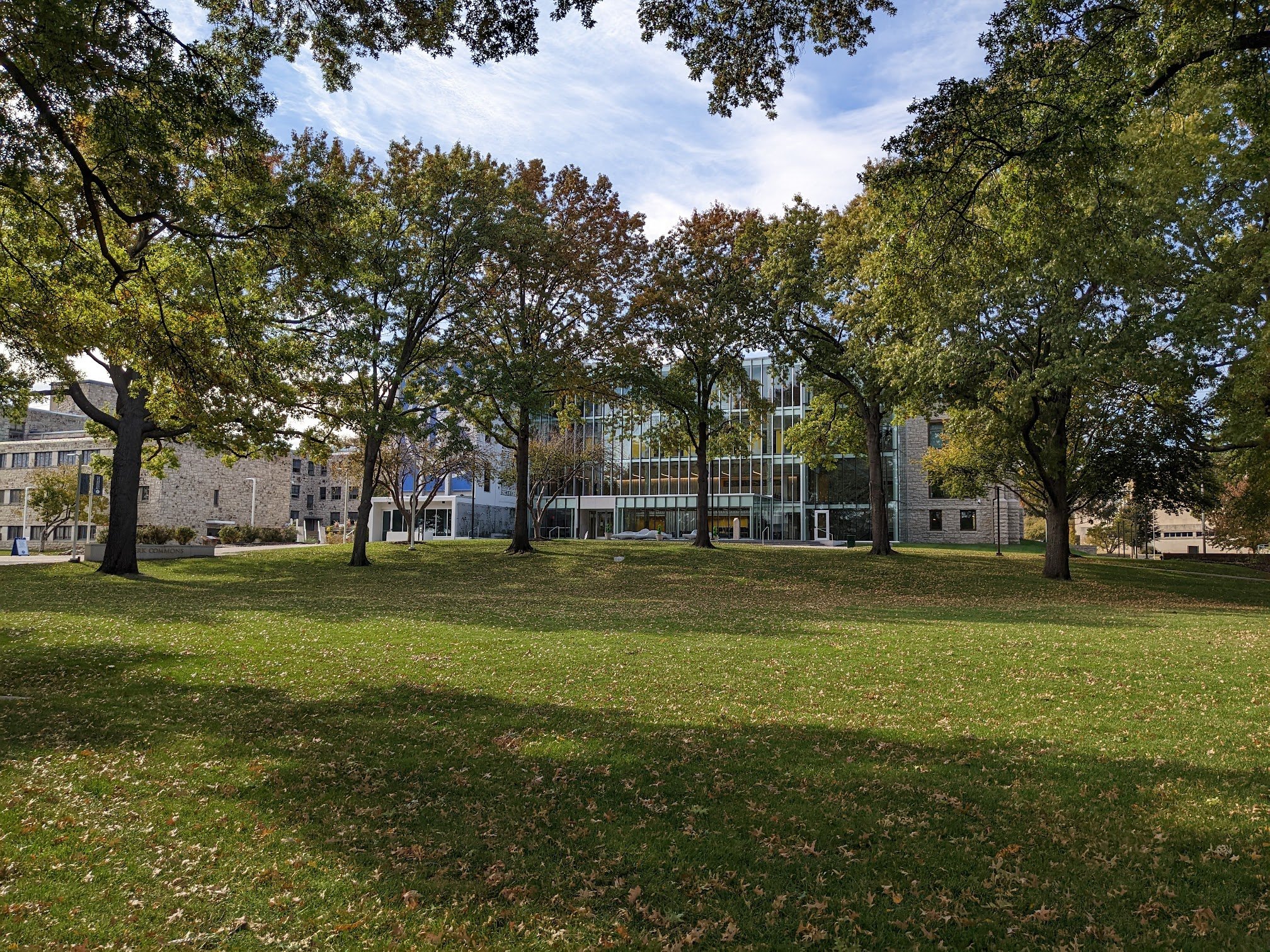The human heart, neurodiversity (ADHD), and desire
Rockhurst University quad. In the foreground, a green field where leaves have begun to fall, surrounded by a circle of trees. Glass and limestone buildings can be seen behind the trees. Sky is mostly cloudy with blue peeking through.
As someone recently diagnosed with ADHD, this is part of my ongoing process of thinking about neurodiversity. For me, the alignment between ADHD and the desire for happiness has turned out quite well. ADHD made me predisposed to discover the desire for happiness and that desire helps me move toward long-term satisfaction.
When I learned that ADHD people are especially motivated by interest, novelty, challenge, urgency, and passion (INCUP) rather than importance, I thought immediately of a philosophy of the human person grounded in desire. Aristotle expressed the fundamental human desire as a desire for happiness, and others have expressed it differently over the years. It occurred to me that whether a person is interest-driven or importance-driven can impact their relationship with this core desire.
Luigi Giussani, a Catholic priest, put it this way. Every human has a desire for truth, beauty, goodness, etc.
“What constitutes this original, elementary experience? It can be described as a complex of needs and 'evidences' which accompany us as we come face to face with all that exists. Nature thrusts man into a universal comparison with himself, with others, with things, and furnishes him with a complex of original needs and 'evidences' which are tools for that encounter. So original are these needs or these 'evidences' that everything man does or says depends on them. These needs can be given many names. They can be summarized with different expressions (for example, the need for happiness, the need for truth, for justice, etc.).
They are like a spark igniting the human motor. Prior to them, there is no movement or human dynamism. Any personal affirmation, from the most banal and ordinary to the most reflected upon and rich in consequences, can be based solely on this nucleus of original needs."
(Religious Sense, 7, line breaks and emphasis added)
What’s intriguing about Giussani is that he presents life as a comparison with all things. A person has this desire for happiness and is driven to compare everything with it. Although this desire for happiness is embraced by (some?) Catholics, it is not necessary to be religious to discover it in oneself. As Giussani himself proposes, the desire for happiness is verifiable within a person’s own experience. I find this need when I look at myself in action. If you don’t I can’t force you to by argument.
Here’s another formulation, an explicitly religious one:
2563 The heart is the dwelling-place where I am, where I live; according to the Semitic or Biblical expression, the heart is the place "to which I withdraw." The heart is our hidden center, beyond the grasp of our reason and of others; only the Spirit of God can fathom the human heart and know it fully. The heart is the place of decision, deeper than our psychic drives. It is the place of truth, where we choose life or death. It is the place of encounter, because as image of God we live in relation: it is the place of covenant.
(Catechism of the Catholic Church, emphasis added)
I like the CCC version because it explicitly states that “The heart is the place of decision, deeper than our psychic drives.“ The desire for happiness is what’s deepest in the human person and whether one leans toward interests or importance is secondary.
With ADHD and with autism, there is a significant inclination toward following interests whereas neurotypical people tend to follow what’s important instead. Importance is connected to what is a priority for a person based on goals, what authority figures indicate as important, and the various good and bad consequences of actions. Following what’s important seems to have been critical for the rise of collective endeavors such as farming, towns and cities, and industrial work. This doesn’t mean that neurodivergent people can’t prioritize what’s important or that neurotypical people can’t follow their interests but they have different approaches to the world.
Looking at these various influences to desire, it would seem that interest-driven people have an advantage. If the basic drive of the person is desire for happiness, then people who lean toward interest (ADHD for example) and those who lean toward importance (neurotypical) would have different responses to this fundamental desire. For a person leaning toward interest, this fundamental desire makes a lot of sense.
The risk for interest-driven people, however, is that of staying at a surface level, and not developing deeper interests and passion. For example, I can spend hours watching videos about different topics just because they stimulate me. A person could also live at the level of sensation, chasing different tastes and extremes. For interest-driven people, the discovery of a great and fundamental desire for beauty and truth can become a unifying factor in life. Without finding this core, interest-driven people risk not discovering the greatest interest of all: passion.
In my experience, discovering passions has helped me to pursue interests longer, and to often persist when I’ve met difficulties. The promise of truth and beauty means that there’s an underlying unity to the world. For me, there’s always the hope that watching some strange video will help me understand something else in my life.
For one leaning toward importance, this fundamental desire may seem like a trap. This can come out especially with parents looking at their children. If I (or they) follow this desire, who knows where it may lead? It can threaten success and other important values. But if it exists, it is just as critical for those who tend toward what important. Without discovering this fundamental desire, they may be efficiently building their success on something that won’t satisfy them.
